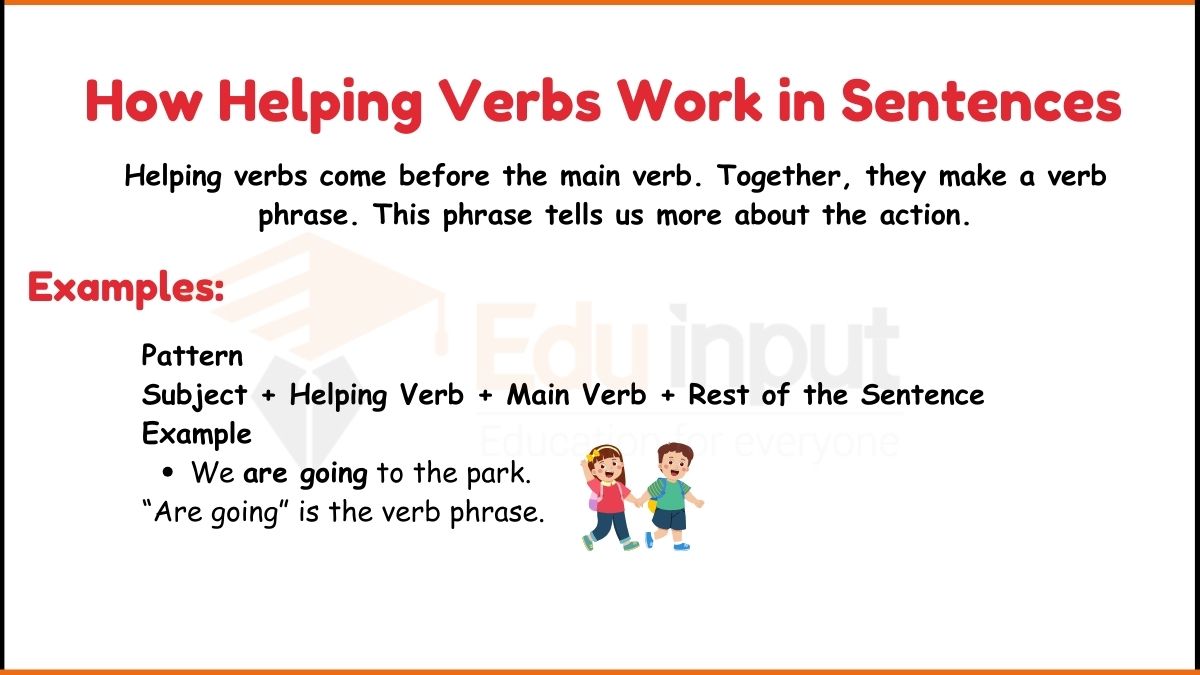Table of Contents
ToggleWhat is Verb?
A verb is a word that describes an action, occurrence, or state of being in a sentence. It tells us what someone or something does or the condition they are in.
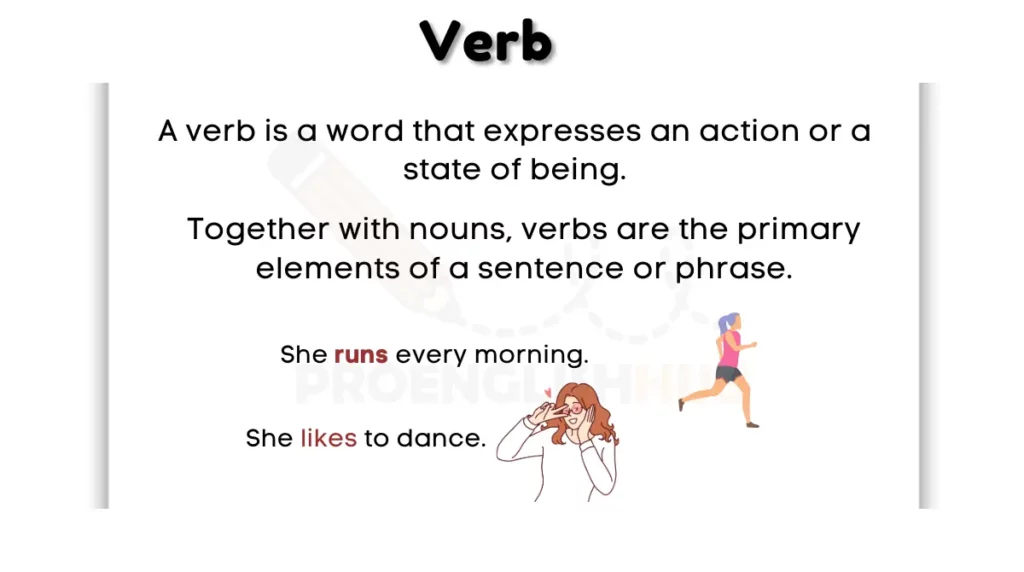
For example, in a sentence, like “She runs every morning”. The verb “runs” signifies the action performed by the subject ‘she.’ Here, “runs” tell us what she does.
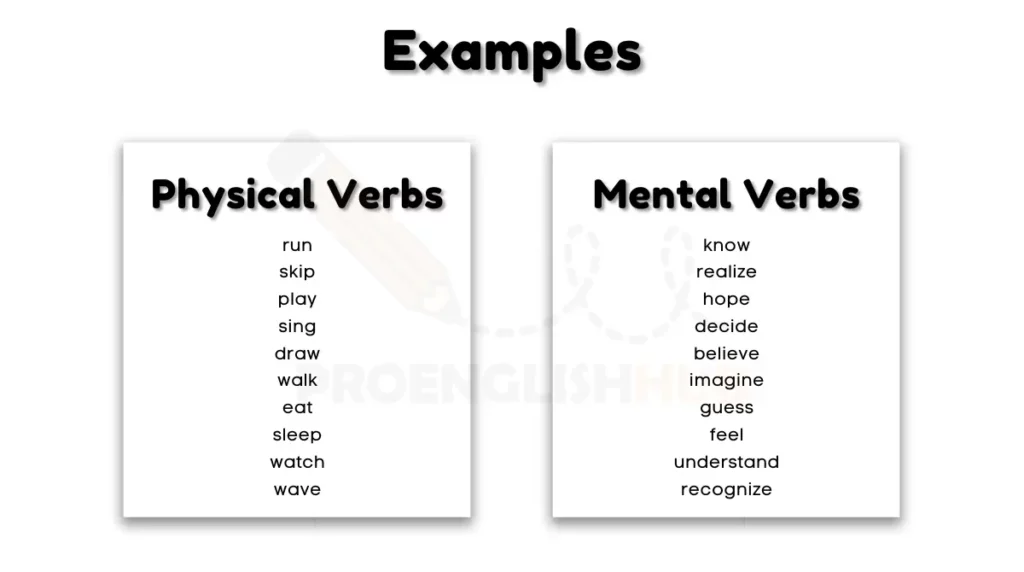
Types of Verb
Here are few types of verb.
1. Action Verbs
Action verbs describe actions or activities performed by the subject. It signifies a physical or mental action. It tells us what what the subject does or experiences in sentence.
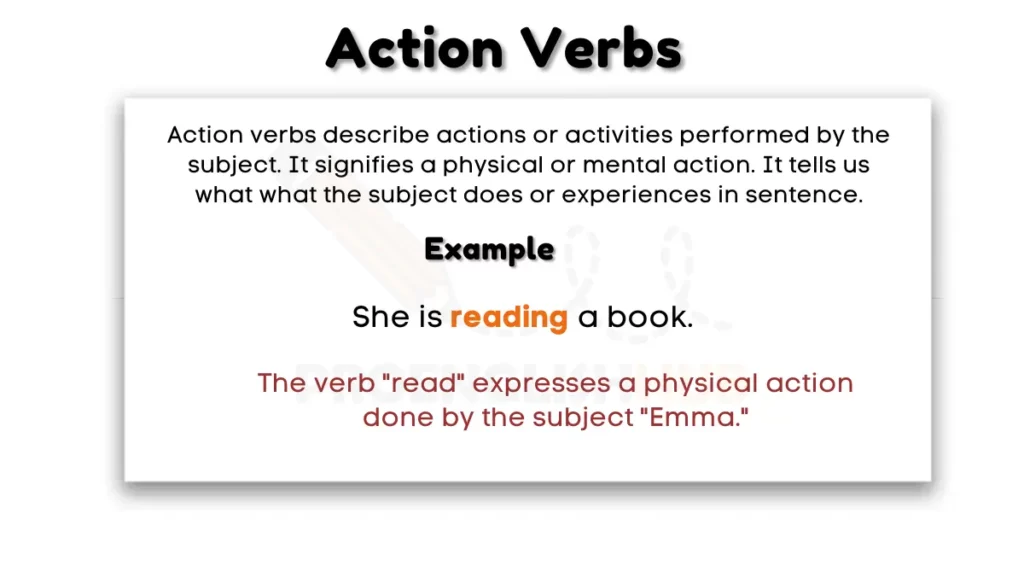
Examples
- She runs every morning.
- They laughed at the funny joke.
- The cat caught the mouse.
2. Stative Verbs
Stative verbs express a state or condition rather than an action. They convey emotions, senses, thoughts, or ownership without a specific action involved..
Examples
- He knows the answer.
- The flowers smell delightful.
- She owns a beautiful house.
3. Transitive Verbs
A verb that requires a direct object to complete its meaning is called transitive verb. They transfer the action to something or someone.
Examples
- He ate the delicious cake.
- She read a fascinating book.
- They built a sandcastle.
4. Intransitive Verbs
A verb does not require a direct object to complete its meaning is called intransitive verb. They stand alone, expressing the action without involving another element.
Examples
- The bird sings melodiously.
- He arrived early.
- The sun sets in the evening.
5. Linking Verbs
Linking verbs connect the subject to a subject complement, which could be a noun, pronoun, or adjective. They describe a state of being.
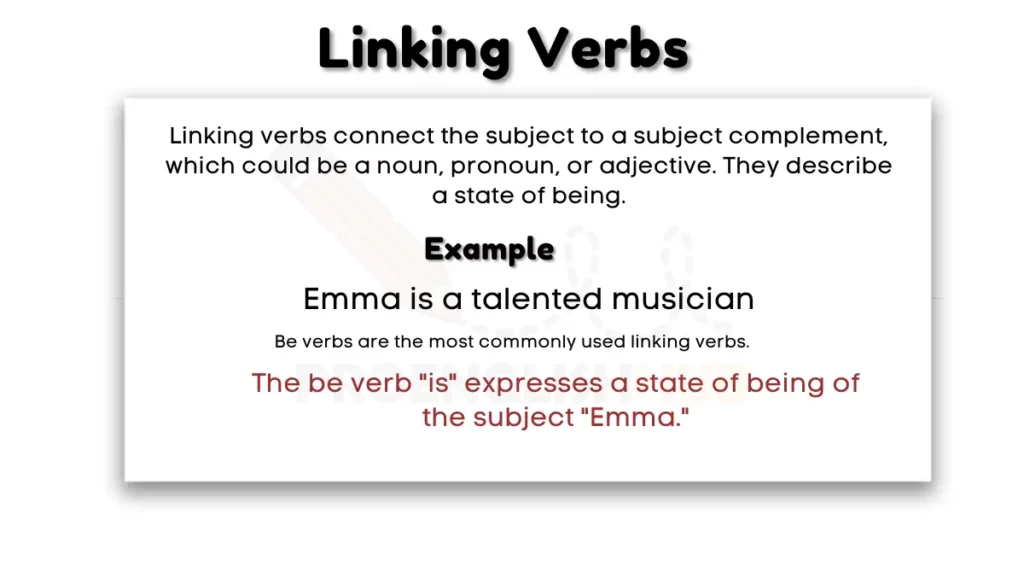
Examples
- She is a talented musician.
- The cake smells delicious.
- They became good friends.
6. Helping Verbs
Helping verbs, also known as auxiliary verbs, assist the main verb in a sentence. They contribute to the formation of tenses, moods, and voices.
Examples
- She is studying for her exams.
- They have completed the project.
- He will go to the party.
7. Modal Verbs
Modal verbs express the speaker’s attitude, ability, necessity, or possibility. They work in conjunction with the base form of the main verb.
Examples
- You can solve this puzzle.
- She must finish her homework.
- He should apologize.
8. Infinitive Verb
An infinitive verb is the base form of a verb that typically appears with the word “to” before it. It is can function as a noun, adjective, or adverb in a sentence.
Examples
- She likes to dance.
- They decided to travel.
- He wants to learn Spanish
9. Reflexive Verb
A reflexive verb reflects the action of the subject back onto itself. It involves an action performed by the subject for or to itself.
Examples
- She brushed her hair before going to sleep.
- They enjoyed themselves at the party.
- He cut himself while cooking.
Rules
1. Subject-Verb Agreement
The verb must match the subject in a sentence. If the subject is singular, use a singular verb; if it’s plural, use a plural verb.
Example
- She works hard. (Singular)
- They work together. (Plural)
2. Consistency in Tense
Stick to one tense unless there’s a clear reason to shift. Mixing past, present, and future tenses within the same sentence or paragraph can be confusing.
Example
- He played football and enjoys painting.
3. Use Correct Form
Use the correct form of the verb based on the sentence structure e.g., past, present, or future. Each tense need specific form of verb.
Example
- She is reading a book.
- They will go to the park.
4. Avoid Double Negatives
Use a negative word only once in a sentence to convey a negative meaning. Double negatives can create confusion.
Example
- She does not want to go, not She does not want to go nowhere.
5. Watch for Irregular Verbs
Be aware of irregular verbs that don’t follow the usual pattern when changing forms e.g., go-went-gone.
Example
- He drinks coffee every morning. Yesterday, he drank tea.
6. Mindful of Verb Phrases
Identify verb phrases, which consist of a main verb and one or more helping verbs. They must work together correctly.
Example
They have been studying for hours.
7. Use Modal Verbs Wisely
Modal verbs e.g., can, could, will, would, should, etc. express possibility, necessity, or ability. Use them appropriately for the intended meaning.
Example
- You can come if you want to.
Examples-Usage in sentences
Here are some examples of verbs used in sentences.
- She plays the piano beautifully.
- The cat purred contentedly on the windowsill.
- They studied for the exam all night.
- The sun rises in the east every morning.
- He built a sandcastle on the beach.
- The chef cooks delicious meals at the restaurant.
- We laughed at the funny movie.
- The children jumped with joy when they saw the presents.
- She reads a new book every week.
- They swim in the pool during hot summer days.
The verb “to be” is one of the most important verbs in English – we use it constantly to:
- Show something exists:
- “There are clouds in the sky”
- “The book is on the table”
- Tell the time or date:
- “Today is Monday”
- “It is 3 o’clock”
- Describe people/things:
- “The coffee is hot”
- “My sister is tall”
- Talk about conditions:
- “I am hungry”
- “The children are tired”
- Give information about someone:
- “She is a doctor”
- “They are from Spain”
How Verb “to be” Complete Conjugation?
Since it’s an irregular verb, it changes form depending on who we’re talking about:
Present tense
- I → am
- You → are
- He/She/It → is
- We/You/They → are
Past tense
- I → was
- You → were
- He/She/It → was
- We/You/They → were
In everyday English, we often shorten (contract) these forms:
- I am → I’m
- You are → you’re
- He/she/it is → he’s/she’s/it’s
- We are → we’re
- They are → they’re
Future Tense (using ‘will’)
- I will be
- You will be
- He/She/It will be
- We will be
- You will be
- They will be
How is it Used in Common Contractions?
Present
- I’m (I am)
- You’re (you are)
- He’s/She’s/It’s (he/she/it is)
- We’re (we are)
- They’re (they are)
Negative Forms
- I’m not
- You aren’t/You’re not
- He/She/It isn’t/He’s not
- We aren’t/We’re not
- They aren’t/They’re not
Special Uses
A) Forming Continuous Tenses
- Present continuous: “I am working”
- Past continuous: “They were sleeping”
- Future continuous: “We will be traveling”
B) Passive Voice
- Present: “The house is built”
- Past: “The letter was sent”
- Future: “The problem will be solved”
Also Read: Nouns Formed From Verbs



